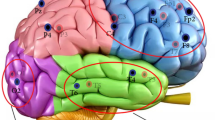Abstract
The effectiveness of the correlation-based method (CFS) for feature selection based on electroencephalogram (EEG) data of the resting state for the purpose of intelligence assessment is investigated. A modification of the CFS is proposed, which makes it possible to vary the cardinality of a subset of selected features using a hyperparameter. A practical example of the analysis of the relationship between the intelligence quotient (IQ), the age of subjects, the features extracted from EEG data, and the effects of their interaction is considered. A comparison of the genetic algorithm and the forward selection was made to find the optimal subset of features within the modified CFS. It was found that it is quite sufficient to use the method of forward selection. Using the nested cross-validation procedure, it was shown that the modified approach gives a lower mean absolute error compared to usual CFS, as well as building a stepwise regression by the forward selection method based on the Bayesian information criterion (BIC). In terms of the mean absolute error, the modified CFS is close to the least absolute shrinkage and selection operator (LASSO) and the improved algorithm Bolasso-S.
Access this chapter
Tax calculation will be finalised at checkout
Purchases are for personal use only
Similar content being viewed by others
References
Forsythe, C., Liao, H., Trumbo, M., Cardona-Rivera, R.E.: Cognitive neuroscience of human systems. Work and Everyday Life. CRC Press: Taylor&Frencis Group (2015)
Haier, R.J., Siegel, B., Tang, C., Abel, L., Buchsbaum, M.S.: Intelligence and changes in regional cerebral glucose metabolic rate following learning. Intelligence 16, 415–426 (1992)
Zarjam, P., et al.: Estimating cognitive workload using wavelet entropy-based features during an arithmetic task. Comput. Biol. Med. 43, 2186–2195 (2013)
Firooz, S., Setarehdan, S.K.: IQ estimation by means of EEG-fNIRS recordings during a logical-mathematical intelligence test. Comput. Biol. Med. 110, 218–226 (2019)
Langer, N., Pedroni, A., Gianotti, L.R.R., Hänggi, J., Knoch, D., Jäncke, L.: Functional brain network efficiency predicts intelligence. Hum Brain Map 33, 1393–1406 (2012)
Zakharov, I., Tabueva, A., Adamovich, T., Kovas, Y., Malykh, S.: Alpha band Resting-State EEG connectivity is associated with non-verbal intelligence: front. Hum. Neurosci. (2020)
Kruschwitz, J.D., Waller, L., Daedelow, L.S., Walter, H., Veer, I.M.: General, crystallized and fluid intelligence are not associated with functional global network efficiency: a replication study with the human connectome project 1200 data set. Neuroimage 171, 323–331 (2018)
Sagaert, Y.R., Aghezzaf, E.H., Kourentzes, N., Desmet, B.: Tactical sales forecasting using a very large set of macroeconomic indicators. Eur. J. Oper. Res. 264(2), 558–569 (2018)
Tibshirani, R.: Regression shrinkage and selection via the lasso. J. R. Stat. Soc. Ser. B (Methodol.) 58(1), 267–288 (1996)
Zhang, Z.: Variable selection with stepwise and best subset approaches. Ann. Transl. Med. 4, 136 (2016)
Hall, M.A.: Correlation-based feature selection for machine learning. Ph.D. thesis. University of Waikato, Hamilton (1999)
Sutter, J. M., Kalivas, J. H.: Comparison of forward selection, backward elimination, and generalized simulated annealing for variable selection: Microchemical journal, vol. 47(1–2), pp. 60–66 (1993)
Saidi, R., Bouaguel, W., Essoussi, N.: Hybrid feature selection method based on the genetic algorithm and pearson correlation coefficient. In: Hassanien, Aboul Ella (ed.) Machine Learning Paradigms: Theory and Application. SCI, vol. 801, pp. 3–24. Springer, Cham (2019). https://doi.org/10.1007/978-3-030-02357-7_1
Chuanlei, Z., et al.: Apple leaf disease identification using genetic algorithm and correlation based feature selection method. Int. J. Agric. Biol. Eng. 10(2), 74–83 (2017)
Gershon, A., Devulapalli, P., Zonjy, B., Ghosh, K., Tatsuoka, C., Sahoo, S.S.: Computing functional brain connectivity in neurological disorders: efficient processing and retrieval of electrophysiological signal data. AMIA Jt Summits Transl. Sci. Proc. 2019, 107–116 (2019)
Bao, F.S., Liu, X., Zhang, C.: PyEEG: an open source Python module for EEG/MEG feature extraction. Comput. Intell. Neurosci. 2011 (2011). art. 406391
Scrucca, L.: GA: a package for genetic algorithms in R. J. Stat. Softw. 53, 1–37 (2013)
Bach, F.R.: Bolasso: model consistent lasso estimation through the bootstrap. In: Proceedings of the 25th international conference on Machine learning, pp. 33–40. Helsinki, Finland (2008)
Acknowledgments
The research is supported by Ministry of Science and Higher Education of Russian Federation (project No. FSUN-2020–0009).
Author information
Authors and Affiliations
Corresponding author
Editor information
Editors and Affiliations
Rights and permissions
Copyright information
© 2022 Springer Nature Switzerland AG
About this paper
Cite this paper
Avdeenko, T., Timofeeva, A., Murtazina, M. (2022). Modified Correlation-Based Feature Selection for Intelligence Estimation Based on Resting State EEG Data. In: Tan, Y., Shi, Y., Niu, B. (eds) Advances in Swarm Intelligence. ICSI 2022. Lecture Notes in Computer Science, vol 13345. Springer, Cham. https://doi.org/10.1007/978-3-031-09726-3_26
Download citation
DOI: https://doi.org/10.1007/978-3-031-09726-3_26
Published:
Publisher Name: Springer, Cham
Print ISBN: 978-3-031-09725-6
Online ISBN: 978-3-031-09726-3
eBook Packages: Computer ScienceComputer Science (R0)




